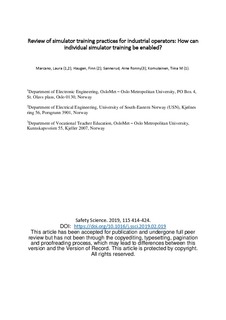Review of simulator training practices for industrial operators: How can individual simulator training be enabled?
Journal article, Peer reviewed
Accepted version
Permanent lenke
http://hdl.handle.net/11250/2626606Utgivelsesdato
2019Metadata
Vis full innførselSamlinger
Sammendrag
The aim of simulator training is to improve the safety and integrity of operations. Effective simulator training involves relevant feedback and sound assessment of the operator’s performance. Operators need proper feedback to be able to identify and fill gaps in their competency or learn new practices. Appropriate feedback and assessment are of great importance to ensure that process operators have the competences required to ensure smooth and safe plant operation. Consequently, delivering effective training and evaluation represents a very significant challenge for the process industry. Further, the availability of on-site simulator training is often very limited and the costs related to it are high. Therefore, individual simulator training, in addition to team training, can be a practical option to be considered. This article presents a thematic analysis of simulator training practices in different industries. The findings suggest that individual training can be implemented as a supplement to on-site training, that effective feedback and assessment are necessary, and that the training should be based on a human-centric perspective.
Beskrivelse
This article has been accepted for publication and undergone full peer review but has not been through the copyediting, typesetting, pagination and proofreading process, which may lead to differences between this version and the Version of Record. This article is protected by copyright.

